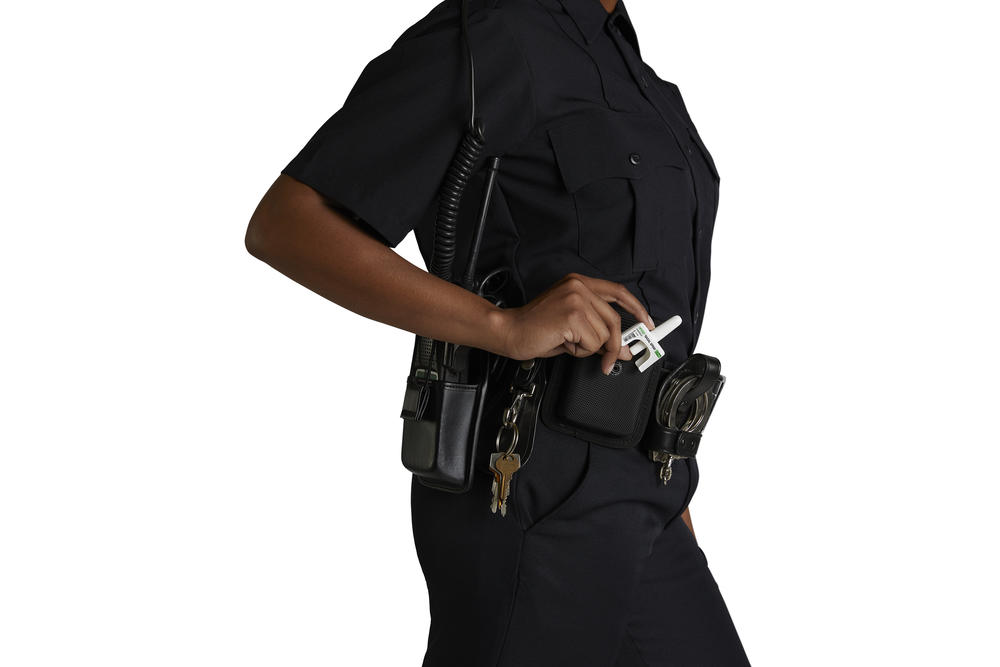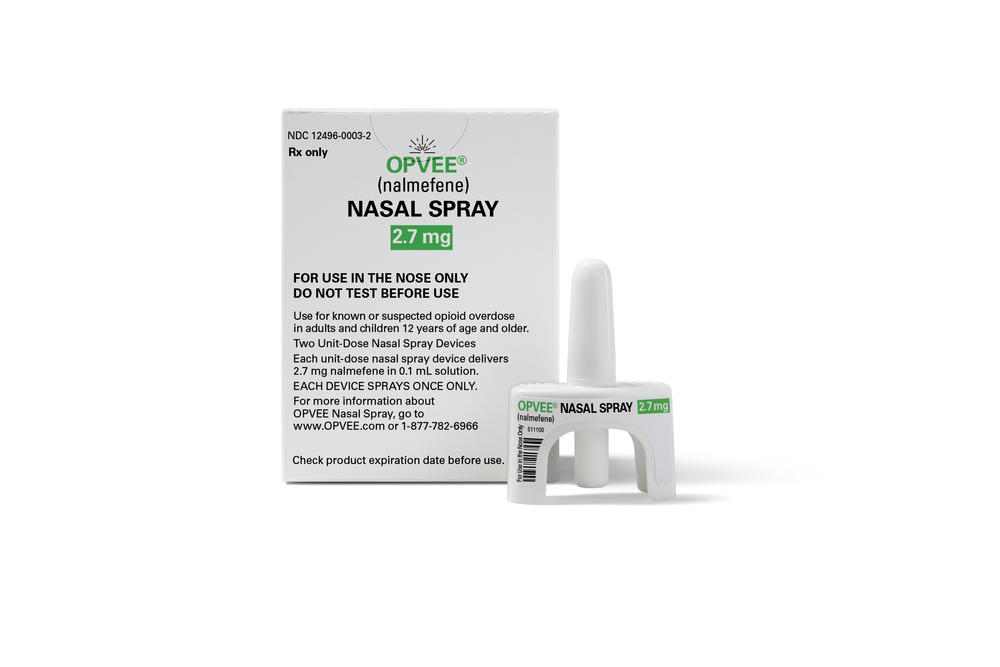
Caption
The Food and Drug Administration approved nalmefene nasal spray (OPVEE) in May 2023. Unlike naloxone nasal spray (Narcan), nalmefene is not available without a prescription.
Credit: Contributed
|Updated: December 18, 2023 9:23 AM
LISTEN: A former surgeon general is advocating for the use of an overdose reversal spray that is stronger and longer-lasting than Narcan. He says Georgia lawmakers should make nalmefene nasal spray available without a prescription. GPB’s Ellen Eldridge has more.

The Food and Drug Administration approved nalmefene nasal spray (OPVEE) in May 2023. Unlike naloxone nasal spray (Narcan), nalmefene is not available without a prescription.
The opioid epidemic evolved from a prescription opioid over-prescribing crisis, former U.S. Surgeon General Dr. Jerome Adams said. Drug overdose is the leading cause of accidental death in the United States, with opioids being the most common drug.
But when doctors and health officials tried to tamp down on prescription narcotic medication, people who developed substance use disorder went elsewhere to find opioids.
"Unfortunately, we felt that that was just squeezing the balloon and it popped out in other areas and it drove people to heroin," Adams said. "Then we saw injection misuse and the sequelae: rising hepatitis C rates and HIV outbreaks."
As the opioid crisis hit epidemic levels, fatal overdoses increased substantially. In an opioid overdose, respiration can slow to the point of unconsciousness and death. More than 106,000 persons in the U.S. died from drug-involved overdose in 2021, including illicit drugs, prescription opioids, and suicide.
Opiant Pharmaceuticals CEO Dr. Roger Crystal developed Narcan nasal spray to reverse the effects of opioid overdose and save a person who is actively dying.
Before it was approved in 2015 by the U.S. Food and Drug Administration, naloxone, the active ingredient in Narcan, was only given intravenously.
Opioids, specifically fentanyl, were involved in more than 70% of the 2,390 drug overdose deaths in Georgia in 2021, according to the state Department of Public Health.
Much of the reason for the stark rise in deaths has to do with fentanyl, which is a synthetic opioid that is up to 50 times stronger than heroin and 100 times stronger than morphine.
"A fentanyl overdose is a lot more dangerous than any other prior form of overdose," Crystal said. "It's going to require multiple doses of naloxone to initially revive someone, and people must be aware that even if they are initially resuscitated, they have a risk that the patient is going to fall back into an overdose again."
That's because naloxone has a half-life of up to two hours, he said, while fentanyl has a half-life of roughly eight hours.
"So when the naloxone wears off, the fentanyl can come back again and bite," Crystal said.
MORE:
Last year, roughly 200 Georgians died each month from drug overdose, according to the Centers for Disease Control and Prevention. These are actually some of the lowest numbers nationwide.
Illegally made fentanyl analogs were the most commonly involved opioids. These are alterations of the medically prescribed drug fentanyl that have similar — but not the same — chemical structure, and they mimic the pharmacological effects of the original drug. And these analogs are showing up in stimulant drugs like cocaine, in which users don't expect opioids.

The most common stimulant involved in overdose deaths was methamphetamine. In Georgia 73.9% of deaths involved at least one opioid and 59.5% involved at least one stimulant.
Nasal nalmefene, now sold via Indivior under the brand name OPVEE, was developed with fentanyl in mind.
The drug was approved nationwide in May.
“OPVEE’s FDA approval represents a significant achievement in the development of new treatment options to address today’s era of opioid overdoses that are driven by powerful synthetic opioids, such as fentanyl,” said Indivior CEO Mark Crossley, CEO.
"It's going to require multiple doses of naloxone to initially revive someone," Crystal said. "And people must be aware that even if they are initially resuscitated, they have a risk that the patient is going to fall back into an overdose again.
Adams said the need to revive someone repeatedly from a drug overdose is a sign of untreated disease.
Judging people with substance use disorder like they have made a poor choice or suffer from a moral failing is only worsening the problem, he said.
If someone had diabetes and they showed up in the emergency room over and over again with diabetic ketoacidosis, that person would be treated each time. Examining the underlying issues is the way to proper treatment.
In the case of diabetes, access to healthy food and insulin helps prevent emergencies.
"We're failing you in terms of putting you in the best possible position to not end up in the emergency room," Adams said. "We need to address those systemic issues."
The same thing is true for someone who has substance use disorder and is overdosing over and over again.
The problem is that once the person is revived, access to treatment and a peer recovery coach is needed.
"What it tells you is that we are not actually creating recovery friendly communities where people can be successful after they leave treatment," Adams said. "And it also tells you that we aren't doing enough on the front end to prevent addiction by addressing mental health issues, by addressing adverse childhood experiences."
Opioid overdose reversal agents, whether naloxone or nasal nalmefene, are important Band-Aids, Adams said, but they're still just one step in the pathway to treatment, recovery and prevention.
Originally, naloxone, which is sold under the name brand Narcan, was only available by prescription from a doctor.
"One of the things I really pushed for in my surgeon general's advisory was to create standing orders," Adams said. "And now all 50 states have standing orders that allow non-physician pharmacists and others to dispense naloxone."
That means Narcan can be purchased and distributed over the counter. But this is not yet the case with nasal nalmefene in Georgia.
"We've seen that entire evolution for naloxone or Narcan to the point that, earlier this year, it was made over-the-counter because it's been shown to be effective and it's been shown to be safe," Adams said. "I actually expect that, eventually, nasal nalmefene will follow that same course."
He said the FDA needs time to observe that this medication, when it's available to the general public, is both safe and effective.
Carrying an opioid overdose reversal medication is crucial for emergency medical workers and people who use drugs, especially outside of the metro Atlanta area. Using either naloxone or nalmefene on a person who is not overdosing on an opioid will not do anything to the victim.
There is a higher overdose rate per capita in rural communities across Georgia than that of urban areas, according to the Georgia Opioid Overdose Annual Surveillance Report from 2020. Counties such as Bibb, Houston, Coffee, Crisp and Dawson had experienced more than 60 overdose-related emergency department visits per 100,000 people whereas counties such as Fulton and DeKalb had fewer than 50 per 100,000.
Public health officials emphasize:
For access to services and immediate crisis help 24/7, call 988 or the Georgia Crisis & Access Line, 1-800-715-4225.